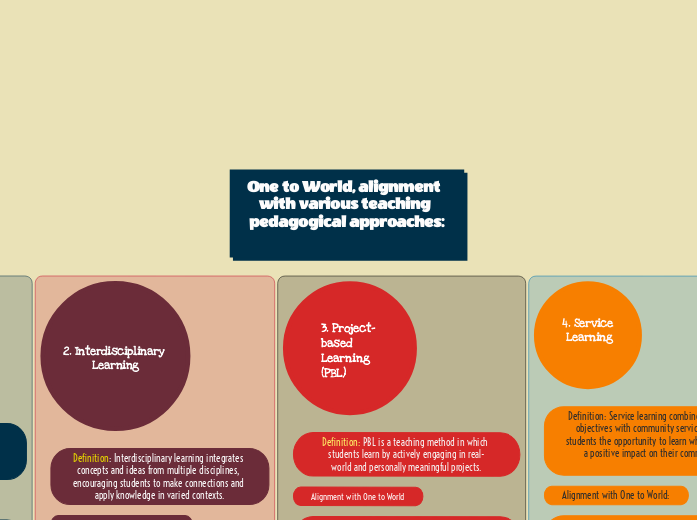One to World, alignment with various teaching pedagogical approaches:
1. Experiential
Learning
Definition: Experiential learning is a process through which students develop knowledge, skills, and values from direct experiences outside a traditional academic setting.
Alignment with One to World:
Direct Engagement: Students interact with peers from different cultures, gaining firsthand experience of global perspectives.
Real-world Contexts: The global classroom offers authentic learning experiences that mirror real-world scenarios, enhancing the depth of learning.
Reflection: Students reflect on their experiences and learn from the diverse viewpoints shared by their global peers.
2. Interdisciplinary
Learning
Definition: Interdisciplinary learning integrates concepts and ideas from multiple disciplines, encouraging students to make connections and apply knowledge in varied contexts.
Alignment with One to World
Cross-curricular Projects: Activities in a global classroom often require knowledge from various subjects (e.g., history, geography, language arts).
Holistic Understanding: By collaborating with international peers, students see how different fields of study intersect and influence each other.
Problem-solving: Interdisciplinary learning in a global context encourages innovative thinking as students solve complex, multifaceted problems.
3. Project-based
Learning (PBL)
Definition: PBL is a teaching method in which students learn by actively engaging in real-world and personally meaningful projects.
Alignment with One to World
Collaborative Projects: Students work on projects with peers from different countries, enhancing their collaborative skills.
Real-world Problems: Projects often address global issues, making the learning experience relevant and impactful.
Student-driven Inquiry: Students have the autonomy to explore topics of interest, guided by their curiosity and the input from their international classmates.
4. Service
Learning
Definition: Service learning combines learning objectives with community service, giving students the opportunity to learn while making a positive impact on their community.
Alignment with One to World:
Global Citizenship: Students participate in projects that address global challenges, fostering a sense of responsibility and global citizenship.
Reflection and Growth: Students reflect on their service experiences, deepening their understanding of global issues and their role in addressing them.
Reflection and Growth: Students reflect on their service experiences, deepening their understanding of global issues and their role in addressing them.
Community Impact: Collaborative projects often have a service component, allowing students to contribute to international communities.
5. Networked
Learning
Definition: Networked learning involves connecting with others (students, educators, experts) through digital means to share resources, ideas, and expertise.
Alignment with One to World:
Global Connections: Students connect with peers, educators, and experts worldwide, creating a vast network of learning resources.
Collaborative Platforms: Utilizing online tools and platforms, students collaborate on projects, share ideas, and provide feedback to each other.
Resource Sharing: Access to diverse perspectives and resources enriches the learning experience, making it more dynamic and comprehensive.
